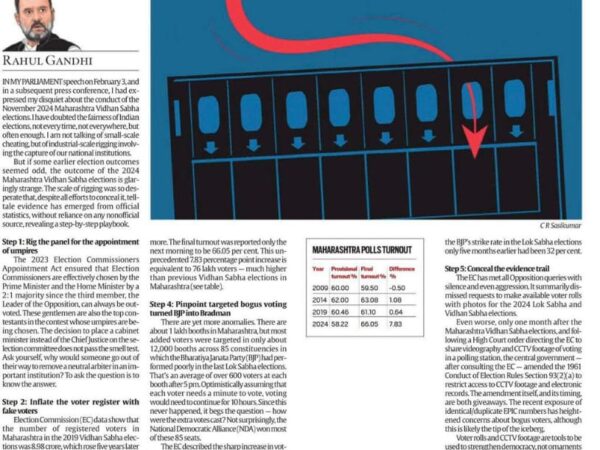
Bureaucracy, anywhere in the world, is expected to be inefficient. The right hand not knowing what the left hand is doing is as universal a truth as bad coffee in government offices. But India is a special case. Here, the right hand not knowing what the left hand is doing is not a mistake. It is policy. It is a deliberate feature, built into the system like an Easter egg that only works if you know the cheat code.
It is not simply inefficiency. It is by design.
The Art of Selective Enforcement.
In India, laws and policies are not meant to be clear. They are meant to be selectively enforceable. Every law, every rule, every process is written in such a way that total compliance is impossible. Not difficult. Impossible.
This is a colonial hangover. The British did not draft laws to empower their subjects. They drafted them to ensure that no one could ever be fully compliant. That way, enforcement was never about legality. It was about discretion. About who had power and who had to supplicate before it. The entire system was designed so that any official, at any time, could find a reason to make your life miserable if they wished to.
That legacy has persisted.
The government does it. Corporations do it. Even private businesses do it. Every system is built with some fine print that is impossible to follow completely, ensuring that rules can be bent, broken, or weaponised as needed.
And sometimes, there is no sinister intent at all. Sometimes, we simply seem to enjoy making things more difficult than they need to be.
Exhibit A: Airline Absurdities.
My ten-year-old daughter was travelling from Pune to Coimbatore with her maternal aunt. Being a cautious parent, her mother—my ex-wife—decided to check if any documentation was required for a minor travelling with a relative.
She checked the Indigo website. There was nothing. The only mention of minors was in the section on “unaccompanied minors,” which Indigo defines as children under 18 travelling alone. Since our daughter was travelling with an adult, we assumed no further documentation was needed.
But just to be sure, we tried calling Indigo. We spent a combined total of nearly two hours navigating the labyrinthine IVR, only to realise that it was not designed to lead to a human being. In the end, we surrendered to the chatbot.
That is when the absurdity began.
The chatbot cheerfully informed us that, yes, a consent letter was required. Not just any letter, but one specifying the exact flight, airport, and timing. It had to include Aadhaar details, phone numbers, and signatures of both parents, the child, and the accompanying adult. This was to avoid any potential custody disputes.
Fair enough. But this raised an obvious question: If both parents’ consent was required when the child was travelling with an aunt, what about a situation where only one parent was travelling with the child? Surely, the same concerns about custody or abduction applied.
The chatbot’s response? No consent letter was required if the child was travelling with one parent.
And that is when it hit me. These were not merely disconnected policies. They were policies created independently, at different times, by different people, without any intention of ever being reconciled.
The Rule-Making Process (or Lack Thereof).
Here is my theory.
At some point, a government mandate required airlines to have a policy for unaccompanied minors. Later, someone in Indigo must have encountered a situation where a minor was travelling with a non-parental relative and decided that there needed to be a process for that too.
The problem? The person who wrote the first rule never met the person who wrote the second. They may not even have been employed at the same time. They certainly never thought to check if their policies contradicted each other.
But this is not incompetence. This is normal.
Because the purpose of these rules is not to ensure child safety. It is to ensure that, should the government ever come knocking and demand to see their paperwork, Indigo can produce a thick file filled with documentation. It is not about passengers. It is about protecting the company.
Exhibit B: Security as Ritual.
This obsession with process over purpose is not unique to airlines. It is a fundamental aspect of how all rules are written in India.
Consider the security guard at any mall. He has no training in identifying weapons or explosives. He would not recognise a bomb if it had a flashing red light and a countdown timer. But he has a metal detector. A wand. And every customer must be ritually scanned.
This is not security. This is a ritual, no different from a religious ceremony, an aarti. In the mind of the security guard, the wand does not detect threats. It purifies customers as they enter, automatically dissolving any ill intent or concealed weapons.
For the mall, it is a magic wand in a different way. If something goes wrong, they can say, “Look, we followed procedure.”
Exhibit C: The Railway Computerisation That Wasn’t.
Or take the great Indian railway computerisation of the late 80s.
When it was first introduced, I excitedly told my father that India had entered the modern age. He asked how the process had changed.
I explained that passengers still had to arrive hours early, fill out forms, find the correct train number, and queue for a ticket. The only difference was that instead of handwriting it, the clerk now entered the details into a computer and printed the ticket.
“So, who benefits from computerisation?” he asked.
The answer was obvious. The railways benefited. The clerks benefited. The passengers? Not so much.
The Real Tragedy.
This is how processes are designed in India. They are not created for the user. They are created for the institution.
A rule is not written to provide clarity. It is written to ensure that, should someone in power decide to use it against you, they can.
That is why, when my daughter and her aunt finally arrived at the airport, the airline staff did not ask for the consent letter. My daughter’s aunt offered it. The airline employee took it, filed it away, and moved on. She did not check the signatures. She did not verify the details. She did not care.
It was a box to be ticked. A meaningless gesture. A ritual.
The real tragedy is not just that these systems exist. It is that we have internalised them.
Even in private companies, even in corporations with no government interference, we write policies the same way. Not for the benefit of customers, but for the convenience of managers, auditors, and legal teams.
We are so conditioned to function within broken systems that we instinctively recreate them.
And that is why the right hand not knowing what the left hand is doing is not a failure of Indian bureaucracy. It is the entire point.



















